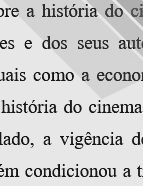

................................
Meanwhile, in 1956, Fernando Duarte launched the first (and only) volume of his História do Cinema [History of Cinema] on the beginnings of cinema, specifically North American and Czech cinema. Finally, in 1962, journalist Manuel Moutinho Múrias also launched his História Breve do Cinema [Concise History of Cinema] (Editorial Verbo [Verbo Publishing House]), a summary with a strong personal bias and lacking historiographical rigour.
In fact, the first outline of a history of Portuguese cinema had appeared some time earlier, in 1946. With over 44 pages, "Panorama histórico do Cinema Português" [“Historical Overview of Portuguese Cinema”] was an offprint of the Anuário Cinematográfico Português [Portuguese Cinema Yearbook] (Edições Gama, 1946), covering the main moments in the history of Portuguese cinema until then and listing the main facts of Portuguese cinema in a chronological and descriptive manner. Manuel Félix Ribeiro, its author, was a prominent figure in Portuguese cinema: he began in the cinematographic milieu as a journalist and was invited by António Ferro to head the cinema section of the Secretariado de Propaganda Nacional [Secretariat of National Propaganda] (SPN); from a very early stage, he was committed to the ambitious task of setting up the "Arquivo Cinematográfico Nacional" [“National Cinematheque”]. In 1948, with the foundation of the Cinemateca Nacional [National Film Library], Félix Ribeiro was appointed the first and main person responsible for this new entity. He was also, most likely, the author of a 24-page brochure published by the SNI only in French, English and German, which outlined a brief overview of Portuguese cinema.
While performing his public duties, Félix Ribeiro became engaged in an activity that prioritised the preservation of Portuguese cinema's heritage, from the search for materials and objects related to cinema to the collection of documents which were thought to be lost, the organisation of exhibitions and the promotion of the first retrospectives dedicated to Portuguese and foreign cinema.
